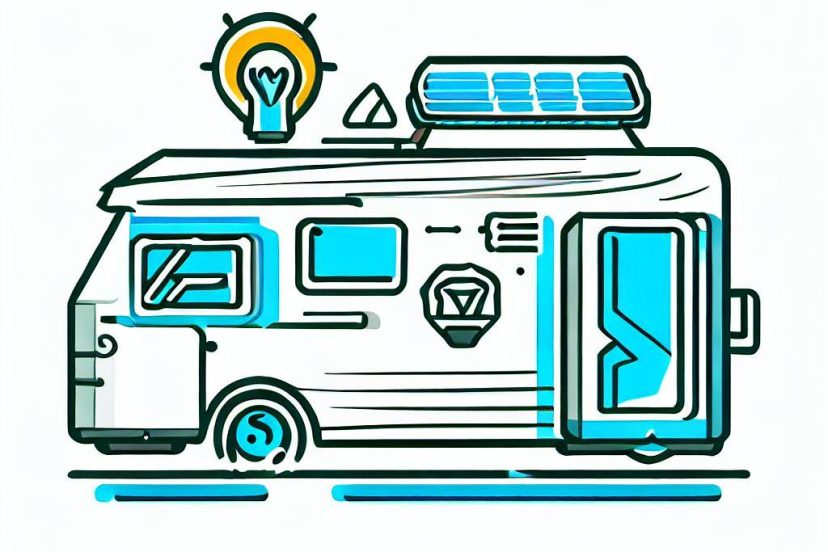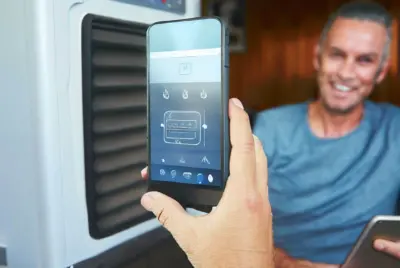The Ultimate Guide to Understanding and Managing RV Appliances
Unraveling RV Appliances: Your Comprehensive Guide
As a seasoned RV enthusiast, I understand that the freedom of the open road, the joy of discovering new destinations, and the comfort of your own mobile home are unparalleled. But let’s be real, the beating heart of every successful RV journey are those trusty RV appliances. This article aims to be your comprehensive guide to all things RV appliances, from buying the best brands to replacing an old unit. Through the various paragraphs, we’ll explore the ins and outs of these crucial components that make your RV truly a home on wheels.
Whether you’re an RV newbie embarking on your first adventure, or a veteran looking to upgrade or maintain your RV appliances, we’ve got you covered. We’ll delve into the intricacies of powering your appliances, how to maintain and service them, and considerations around energy efficiency. Moreover, we’ll shed light on RV appliance costs and suggest space-saving options for those dealing with smaller RVs. No stone is left unturned as we provide practical insights and tips to enhance your RV lifestyle.
Navigating the World of RV Appliances: The Best Brands to Consider
 Choosing the right appliances for your RV can significantly influence your comfort and convenience on the road. After all, these are the tools that’ll let you whip up your meals, keep your drinks cool, and ensure you’ve got warm water for your shower after a long day of adventuring. So, let’s delve into the best RV appliance brands you should consider.
Choosing the right appliances for your RV can significantly influence your comfort and convenience on the road. After all, these are the tools that’ll let you whip up your meals, keep your drinks cool, and ensure you’ve got warm water for your shower after a long day of adventuring. So, let’s delve into the best RV appliance brands you should consider.
Among the top brands in the industry, Dometic stands out. They are well-known for their high-quality refrigerators, air conditioners, and awnings. Their products are reliable, durable, and designed to withstand the rigors of the road. I’ve used Dometic appliances myself, and I can vouch for their performance.
Next up is Norcold. This brand specializes in compact, low-energy consumption refrigerators. If you’re concerned about power usage in your RV, Norcold is a brand worth considering. Their appliances are designed specifically for RV use, so they fit comfortably in smaller spaces without sacrificing functionality.
Finally, we have Suburban, a brand famous for its range of water heaters and furnaces. When it comes to reliable heating solutions, they’re a name to trust. Nothing beats a warm shower after a day of outdoor activities, and Suburban delivers on that front.
In conclusion, Dometic, Norcold, and Suburban are three of the best brands to consider when outfitting your RV. Remember, choosing appliances that fit your space, lifestyle, and energy needs is key. After all, your RV is your home on wheels, and it deserves the best!
Powering RV Appliances: Your Guide to Energy on the Move
Powering your RV appliances is a crucial aspect of life on the road. As an RV enthusiast, I’ve had my share of experiences and learned a few essential tips along the way. Here’s my take on how to keep your RV appliances running smoothly.
Most RVs come with a mix of 12-volt DC power and 120-volt AC power. Your RV’s battery powers the 12-volt system, and it usually takes care of lighting, water pumps, and sometimes your refrigerator. Your 120-volt system, on the other hand, powers higher-consumption appliances like your air conditioner, microwave, and power outlets.
Now, the question arises, how do you get that 120-volt AC power? There are three main ways: shore power, generators, and power inverters. Shore power is when you plug your RV into an external power source at a campground. It’s the most reliable, but it ties you down to powered campsites.
Generators can be built-in or portable, giving you the freedom to camp off the grid. However, they require fuel, and the noise can sometimes be a downside. Inverters convert your 12-volt DC power into 120-volt AC power, allowing you to use your outlets even when not connected to shore power or a generator. It’s a handy backup, but remember it’s drawing from your battery.
Managing your power sources efficiently ensures a seamless RV life. You can enjoy all the comforts of home, from brewing a pot of coffee to cooling down with the air conditioner. Understanding how to power your RV appliances makes the journey even more rewarding.

RV Appliances versus Home Appliances: What’s the Difference?
Can you fit regular home appliances in an RV? This is a question I’ve come across numerous times. It’s a valid question, considering the comforts home appliances can bring. However, when it comes to RV appliances, there are a few things you need to understand.
Firstly, the physical space within an RV is considerably smaller than a traditional home’s. Home appliances are usually larger and may not fit into the tight quarters of an RV. I once tried to install a home microwave in my RV, only to realize that it took up way too much precious counter space!
Secondly, power consumption is a major concern. Home appliances generally run on a higher voltage than RV appliances. Your RV’s power system might not be able to handle the load of running home appliances, especially if you’re relying on battery power or solar panels.
Finally, the weight is another factor to consider. RVs have weight limitations, and home appliances can significantly add to the load. This can impact your fuel efficiency and even cause wear and tear on your RV.
So, while it might seem appealing to bring the comforts of home into your RV, it’s usually more practical to opt for RV-specific appliances. They are designed with the size, power, and weight constraints of RVs in mind. Thus, while it’s possible to use home appliances in some situations, it’s usually best to stick with appliances specifically designed for the RV lifestyle.
Understanding the Lifespan of RV Appliances: How Long Will They Last?
When equipping your RV, you’re investing not just in the comforts of a mobile home, but also in the longevity of these amenities. Many fellow RV enthusiasts often ask, “What’s the average lifespan of RV appliances?” Well, let’s dive into that topic.
Like any appliance, the lifespan of RV appliances can vary based on brand, usage, and maintenance. Generally, with good care, you can expect them to last a significant amount of time. For example, RV refrigerators typically last between 10 to 15 years, while an RV water heater can function efficiently for about 6 to 10 years. Your RV air conditioner should give you a good 10 to 15 years of cooling if well-maintained.
Now, the trick to increasing the longevity of these appliances lies in regular maintenance and usage. Just like a car, RV appliances do better with regular use. Leaving your RV dormant for long periods can lead to issues. Regular cleaning, timely repairs, and preventive maintenance checks go a long way in extending the lifespan of your RV appliances.
The lifespan of RV appliances can range widely, but with proper care, you can expect a good number of years from them.
Remember, maintaining your RV appliances isn’t just about making them last longer; it’s also about enjoying a safe, comfortable, and trouble-free journey as you explore the open road.
Preserving the Journey: Maintaining and Servicing RV Appliances
As an avid RV camper, I can affirm that RV appliances are the lifeline of our mobile homes. However, their efficiency rests on regular maintenance and servicing. So how do you keep these vital systems in check? Let’s talk about that.
First, understanding your appliances is crucial. Each appliance has its unique specifications and requirements, which are usually detailed in the user manual. If you don’t have the manual handy, many are available online. Familiarize yourself with these details.
Next, ensure regular cleaning and inspection. For instance, your RV refrigerator needs to have its vents cleaned regularly to avoid overheating. Similarly, the water heater should be flushed out periodically to prevent sediment buildup. Consistent checks for potential issues will help nip problems in the bud.
Don’t forget about the filters. Appliances like air conditioners and water systems have filters that need regular cleaning or replacing. Clogged or dirty filters can greatly reduce the efficiency of your appliances.
Lastly, don’t shy away from professional help. Even with the best DIY maintenance routine, it’s advisable to have your RV appliances professionally serviced at least once a year. Experts can spot issues you may miss and ensure your appliances are in peak condition.
Maintaining and servicing your RV appliances increases their lifespan and makes your travels more comfortable and worry-free. Remember, your RV is a home on wheels, and just like any home, it needs regular care and attention.
The Green Road Trip: Energy-Efficient RV Appliances
As an RV camping aficionado, I’m always on the lookout for ways to make my mobile living more sustainable and efficient. A common question I encounter from fellow campers is, “Are there energy-efficient RV appliances?” Well, the answer is a resounding yes!
Today’s RV industry has embraced the green revolution, and there’s an array of energy-efficient appliances that can significantly reduce your energy consumption. For instance, energy-efficient RV refrigerators, air conditioners, and heaters are available from several leading brands. These appliances are designed to provide the same level of comfort while using a fraction of the energy.
For cooking, consider induction cooktops. They are energy-efficient and safer, as they don’t get as hot as traditional burners. LED lighting is another simple and effective way to reduce energy usage. They last longer and consume less power compared to incandescent bulbs.
Moreover, pairing these appliances with renewable energy sources, like solar panels, can further enhance your RV’s energy efficiency. Solar power can provide enough energy to run most of your RV appliances without needing a generator or shore power.
Energy-efficient RV appliances are an excellent investment toward sustainable RV living. They reduce your carbon footprint and save you money in the long run by lowering your energy costs. So, gear up and embrace the green journey on the open road!
Budgeting Your Mobile Home: The Cost of Typical RV Appliances
When planning for the RV lifestyle, understanding the cost of RV appliances is essential. As an RV enthusiast, I’m often asked, “How much do typical RV appliances cost?” Today, let’s delve into this important topic.
The price of RV appliances varies widely based on the type of appliance, brand, and whether it’s new or used. However, to give you a ballpark figure, here’s a rough estimate for some common RV appliances:
- RV refrigerator: These essential appliances typically cost between $1,000 and $3,000.
- RV air conditioner: Expect to pay around $500 to $1,000 for a new unit.
- RV water heater: These usually range from $300 to $600.
- RV microwave: A simple RV microwave can cost anywhere between $50 and $200.
Keep in mind these are just averages, and prices can fluctuate based on a variety of factors. Additionally, it’s not just the initial cost of these appliances you need to consider. Maintenance, repair, and energy consumption costs also play a part in the total cost of ownership.
While the cost of RV appliances can add up, they’re essential for a comfortable and convenient RV lifestyle. You can find options that fit your budget and needs by doing thorough research and shopping around. After all, investing in your mobile home is part of the adventure. Happy travels!
Ready to Roll: Standard Appliances in Most RVs
Stepping into the RV lifestyle, you may wonder, “What RV appliances come standard in most RVs?” Well, let’s dive into this topic and uncover the answers.
The beauty of RV living is that it brings the conveniences of home on the road. This includes a variety of standard appliances that you’d find in a typical household, albeit often on a smaller scale. I’ve seen several staples across various RV models.
Most RVs come equipped with a compact refrigerator. This essential appliance allows you to store perishable food items during your travels. Another standard appliance is the stove or cooktop, paired with an oven in some models, perfect for cooking up your favorite meals on the go.
Most RVs also include a microwave, a convenient solution for quick meals or reheating leftovers. Heating and cooling systems are other standard appliances crucial for maintaining a comfortable environment regardless of outside weather. Additionally, you’ll find a basic bathroom setup, complete with a flushing toilet and a shower.
Last but not least, most RVs come with a water heater. This handy appliance ensures you have hot water for showers, dishwashing, and more.
Standard RV appliances are designed to provide the comforts of home while out on the open road. Remember, not all RVs are created equal, so you must check the specific features of the RV model you’re interested in.
Compact Convenience: Space-Saving Appliances for RVs
Space is a precious commodity when it comes to RV living. When it comes to RV appliances, the question often arises: “What are some space-saving appliances for RVs?” Allow me to share a few of my personal favorites as an RV camping enthusiast.
One of the most significant advancements in RV appliances has to be the combination washer and dryer. This 2-in-1 unit saves valuable space by providing both functions in a single appliance. Additionally, it’s a huge time saver when you’re out exploring nature rather than spending hours at a laundromat.
The next on my list is a compact microwave or a convection microwave oven. Not only can these heat up your leftovers, but the convection feature allows you to bake and roast, eliminating the need for a full-sized oven.
Next up is the 3-way refrigerator. It’s compact, but its versatility makes it a winner. It can operate on AC power, DC power, or propane, ensuring you always have a way to keep your food cool.
Another noteworthy appliance is the portable induction cooktop. They’re small, efficient, and offer precise control over cooking temperatures. Plus, they only heat the cookware, making them a safer choice for the close quarters of an RV.
If you want to add a little luxury to your experience then an RV dishwasher is pretty nice. It makes clean up so much easier and gives you more time to sit back and enjoy the outdoors. However, it can take up precious space in the cabin. Space that might better be used as storage.
Space-saving RV appliances are all about functionality and versatility. They allow you to enjoy the comforts of home, no matter how far you roam, without sacrificing valuable space. Remember, every inch counts in an RV, so choose your appliances wisely!
Swapping Out Spaces: How to Replace an Appliance in Your RV
There’s nothing I enjoy more than hitting the open road. But with all that travel, RV appliances can wear down or even break. So, the big question is, “How do I replace an appliance in my RV?” Here are some straightforward steps to help you through the process.
The first order of business is to measure your existing appliance. The dimensions are crucial as most RVs have tailored spaces for appliances. The last thing you want is a shiny new fridge that’s too big for your RV!
Once you’ve got the measurements, it’s time to shop around for a suitable replacement. Look for RV-specific appliances since they’re designed to withstand the rigors of road travel. They may cost a bit more, but their durability makes it a worthy investment.
After purchasing, the next step is the removal of the old appliance. Make sure you turn off any power or gas connections to the appliance before you start. This part can be tricky, so you may want to recruit a friend or two to help with the heavy lifting.
Installation of the new appliance is essentially the reverse process. Be careful while moving the new appliance into position to avoid damaging your RV’s interior. Then, hook it up to the appropriate connections. Test it thoroughly to ensure everything is working as it should.
Replacing RV appliances isn’t as daunting as it might seem. It’s all about preparation, careful handling, and ensuring that everything is securely connected. Armed with these tips, you should be well on your way to installing your new RV appliance.
Conclusion
From refrigerators to heaters, from power sources to lifespan, RV appliances are indeed the unsung heroes of our RV adventures. They may not often be in the limelight, but their importance is undeniable. From this comprehensive guide, it’s clear that understanding, maintaining, and servicing these appliances are vital to keep our mobile homes running smoothly.
Whether you’re just starting your RV journey or are a seasoned traveller looking to upgrade your existing setup, we hope this guide has provided valuable insights to help you along the way. After all, an informed RVer is a happy RVer! As we conclude this journey through the world of RV appliances, remember, the road is long and filled with adventures. Take care of your appliances, and they’ll take care of you. Safe travels, and happy RV-ing!
FAQs
Q: Can I run all of my RV appliances at the same time?
A: It depends on the total power draw of your appliances and the power supply capacity of your RV. Be cautious not to overload your RV’s electrical system.
Q: Can I install an appliance by myself in my RV or do I need professional help?
A: While some smaller appliances may be easy to install, for larger ones like refrigerators or air conditioners, it’s advisable to seek professional help to avoid mishandling or damaging your RV’s electrical system.
Q: Is it okay to use my RV appliances while driving?
A: Some appliances like the refrigerator should be running, but others, like the stove, should not be used while driving due to safety concerns. Always follow the manufacturer’s guidance.
Q: Can I use solar panels to power my RV appliances?
A: Yes, solar power is a great renewable energy source for RVs, but it requires an investment in panels, batteries, and possibly an inverter. Remember, your ability to gather solar power will depend on weather conditions and location.
Q: Do RV appliances require any special cleaning or maintenance procedures?
A: While regular cleaning is recommended for all appliances, some may require additional maintenance. For example, RV refrigerators should be defrosted regularly, and air conditioners may need their filters cleaned or replaced. Always refer to the user manual for specific care instructions.




